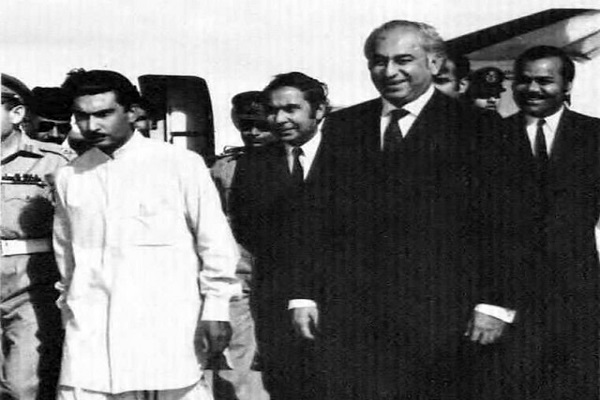Peshawar, Pakistan: The land of the Pashtuns is a story written with the ink of sacrifice, patriotism, and service. Its history spans thousands of years, marked by the indelible contributions of its leaders. Among these towering figures, Hayat Muhammad Khan Sherpao stands out as a beacon of courage, political acumen, and selflessness. His life embodied the Pashtun values of service and sacrifice, and his martyrdom left an enduring mark on the region’s political and social fabric.
Born in 1937 into the illustrious family of Khan Bahadur Ghulam Haider Khan in Sherpao, Charsadda, Hayat Muhammad Khan Sherpao emerged as a symbol of hope for the Pashtun nation. His political journey, marked by courage and commitment, culminated in his ultimate sacrifice, which paved the way for his family’s enduring legacy of service and leadership.
A Life Dedicated to Leadership and Progress
From his early education under his father’s guidance to his years at Islamia College, Peshawar, Sherpao’s intellectual and moral foundations were firmly laid. His natural charisma and leadership emerged during his student years, earning him a reputation as a fearless and principled advocate for justice.

Sherpao’s political career began with the Pakistan Muslim League, where he supported Fatima Jinnah in her campaign against Ayub Khan’s military dictatorship. However, his defining moment came when Zulfikar Ali Bhutto invited him to join the Pakistan Peoples Party (PPP) in 1967. Sherpao embraced Bhutto’s vision wholeheartedly, becoming the first chairman of the PPP in the then North-West Frontier Province (NWFP).
His leadership was instrumental in mobilizing the masses, especially in NWFP, against Ayub Khan’s dictatorship. Despite police repression, Sherpao and Bhutto led rallies and gatherings that united the people under the banner of democracy and socialism.
A Visionary in Governance
Sherpao’s remarkable administrative skills came to the forefront during his tenure as Governor of NWFP and later as Federal Minister for Power and Natural Resources. He spearheaded numerous development projects, improving infrastructure and creating jobs, which helped alleviate poverty in the province.
However, his growing popularity and effective leadership made him a target for extremist forces. On February 8, 1975, Hayat Muhammad Khan Sherpao was martyred in a tragic bomb blast at Peshawar University when a bomb was planted in a vase of flowers and was put at the table in front of him on stage where he was sitting. His untimely death left the nation in mourning and deprived the Pashtuns of a leader who could have shaped their future for the better.
Aftab Ahmad Khan Sherpao: Continuing the Legacy of Service
Following the tragic loss of Hayat Muhammad Khan Sherpao, his younger brother, Aftab Ahmad Khan Sherpao, stepped forward to continue his mission. Aftab, inspired by his brother’s vision and sacrifice, emerged as a formidable political leader and a champion for the Pashtun people.
Aftab Sherpao played a pivotal role in keeping the family’s political legacy alive, serving in various key positions, including as Chief Minister of Khyber Pakhtunkhwa and Federal Interior Minister. His leadership during challenging times demonstrated resilience and commitment to the values his elder brother upheld.
Aftab’s political journey was marked by his dedication to promoting peace, stability, and development in Khyber Pakhtunkhwa. He remained steadfast in advocating for the rights of the Pashtuns and addressing the issues of terrorism, underdevelopment, and poverty that plagued the region. His efforts to carry forward Hayat Muhammad Khan Sherpao’s vision kept the ideals of service and sacrifice alive.
Sikandar Hayat Khan Sherpao: A Torchbearer for the Next Generation
The Sherpao legacy found its next torchbearer in Sikandar Hayat Khan Sherpao, the son of Aftab Ahmad Khan Sherpao. Sikandar, following in the footsteps of his father and uncle, became a vital figure in Khyber Pakhtunkhwa’s political landscape.
Sikandar’s journey reflects the values instilled by his family—courage, dedication, and a deep commitment to public service. As a member of the Khyber Pakhtunkhwa Provincial Assembly and holding significant ministerial portfolios, he focused on improving governance, promoting education, and addressing the socio-economic challenges of the province.
Sikandar’s leadership has been instrumental in fostering youth empowerment, community development, and reforms in governance. His ability to navigate modern political challenges while remaining rooted in the values of his family underscores his role as a vital force for progress.
An Enduring Legacy
The Sherpao family’s contributions to the Pashtun nation are unparalleled. From the visionary leadership and martyrdom of Hayat Muhammad Khan Sherpao to the resilience and dedication of Aftab Ahmad Khan Sherpao, and the modern leadership of Sikandar Hayat Khan Sherpao, their legacy continues to inspire generations.
The story of the Sherpaos is one of service, sacrifice, and a relentless commitment to the well-being of their people. Their contributions serve as a reminder that true leadership is defined not by power but by the ability to inspire, uplift, and transform. The Pashtun nation, shaped by their sacrifices, will forever honor the Sherpao family as symbols of courage, dignity, and hope.
